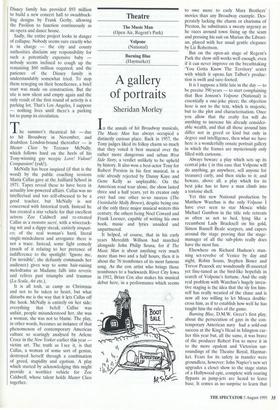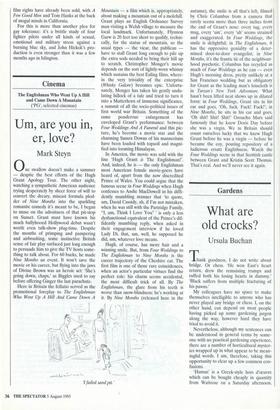Theatre
The Music Man (Open Air, Regent's Park)
Volpone (National)
Burning Blue (Haymarket)
A gallery of portraits
Sheridan Morley
In the annals of hit Broadway musicals, The Music Man has always occupied a distinctly curious place. Back in 1957, the Tony judges liked its folksy charm so much that they voted it best musical over the rather more dangerous and urban West Side Story, a verdict unlikely to be upheld by history. It also won a best-actor Tony for Robert Preston in his first musical, in a role already rejected by Danny Kaye and Gene Kelly as unplayable. On the American road tour alone, the show lasted three and a half years, yet its creator only ever had one other so-so success (The Unsinkable Molly Brown), despite being one of the only three major musical writers this century, the others being Noel Coward and Frank Loesser, capable of writing his own book, music and lyrics unaided and unpartnered.
It helped, of course, that in his early years Meredith Willson had marched alongside John Philip Sousa, for if The Music Man is about anything very much more than two and a half hours, then it is about the 76 trombones of its most famous song. As the con artist who brings those trombones to a backwards River City Iowa in 1912, Brian Cox also makes his musical debut here, in a performance which seems
to owe more to early Marx Brothers' movies than any Broadway example. Des- perately lacking the charm or charisma of Preston, he substitutes a sweaty urgency as he races around town fixing up the scam and pressing his suit on Marian the Librari- an, played with her usual gentle elegance by Liz Robertson.
But on the open-air stage of Regent's Park the show still works well enough, even if it can never improve on the breathtaking 'You Gotta Know The Territory' sextet with which it opens. Ian Talbot's produc- tion is swift and sure-footed.
It is I suppose a little late in the day — to be precise 390 years — to start complaining that Ben Jonson's Volpone (National) is essentially a one-joke piece; the objection here is not to the text, which is majestic, but to the plot and characterisation. Once you allow that the crafty fox will do anything to increase his already consider- able wealth, and that all those around him differ not in greed or kind but only in degree and intelligence, then what we have here is a wonderfully ornate portrait gallery in which the frames are mysteriously only filled with cartoons.
Always beware a play which sets up its central joke ( in this case that Volpone will do anything, go anywhere, sell anyone for treasure) early, and then sticks to it; and beware, above all, a play which for its best joke has to have a man climb into a tortoise shell.
Yet this new National production by Matthew Warchus is the only Volpone I have ever seen to star Mosca: while Michael Gambon in the title role retreats as often as not to bed, lying like a recumbent Lady Bracknell on his gold, Simon Russell Beale scarpers, and capers around the stage proving that the stage- manager of all the sub-plots really does have the most fun.
Elsewhere on Richard Hudson's stun- ning set-revolve of Venice by day and night, Robin Soans, Stephen Boxer and Trevor Peacock are wondrously ill-assorted yet fine-tuned as the bird-like hopefuls in search of Volpone's fortune. And the only real problem with Warchus's hugely inven- tive staging is the idea that the sly fox him- self has really wearied of the chase and is now all too willing to let Mosca double- cross him, as if to establish how well he has taught him the rules of the game.
Burning Blue, D.M.W. Greer's first play, about the persecution of gays in the con- temporary American navy had a sold-out success at the King's Head in Islington ear- lier this year but, all the same, it was brave of the producer Robert Fox to move it in to the more opulent and Victorian sur- roundings of the Theatre Royal, Haymar- ket. Fears for its safety in transfer were groundless, however: John Napier's new set upgrades a closet show to the stage status of a Hollywood epic, complete with roaring flypasts as jump-jets are heard to leave base. It comes as no surprise to learn that film rights have already been sold, with A Few Good Men and Tom Hanks at the back of mogul minds in California.
For this is more than another plea for gay tolerance: it's a brittle study of four fighter pilots under all kinds of sexual, emotional and military stress against a burning blue sky, and John Hickok's pro- duction is even stronger than it was a few months ago in Islington.



















































 Previous page
Previous page